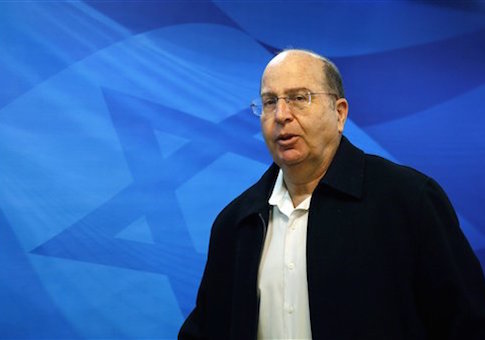JERUSALEM—Hinting at steps Israel might take to prevent an Iranian nuclear breakout, Defense Minister Moshe Yaalon told an interviewer last week "I’m not responsible for the longevity of Iranian scientists."
Israel has been accused by Iran of the assassination of six senior Iranian nuclear scientists in recent years as well as a Revolutionary Guard general involved in the development of long-range missiles capable of carrying nuclear warheads.
In the interview with the German news weekly, Der Spiegel, published over the weekend, Yaalon termed the recent nuclear deal between Iran and Western powers "an historic mistake."
Said Yaalon: "In the end, one way or another, the Iranian military nuclear ambitions should be stopped. We can in no way tolerate an Iran with nuclear weapons. We prefer for this to be done through a deal or sanctions. But in the end Israel should be able to defend itself."
Asked whether this position meant that there might be more assassinations of Iranian scientists in the future and more cyber attacks on Iranian computer networks, Yaalon replied "We should be ready to protect ourselves. I’m not responsible for the longevity of Iranian scientists."
The cyber attacks, reportedly undertaken by Israel and the United States, set back the Iranian program appreciably by sabotaging computers linked to the nuclear program and destroying centrifuges. Israel has reportedly desisted from such activity since Iran entered into negotiations with the United States and other Western powers.
Yaalon was sharply critical of the deal that subsequently emerged and of the way the negotiations were conducted. "My gut feeling is that political leaders in the West prefer to postpone the problem for the next day, for the next year, for the next term," he said. "There have been points in history in which people believed that reconciliation might bring a solution, but in the end we paid a high price [an allusion to British Prime Minister Neville Chamberlain’s meetings with Hitler in 1938]. This is the case with Iran now."
Yaalon, a former army chief of staff, said Israel had supported a negotiating strategy that would have forced the rulers in Teheran to choose between acquiring a nuclear bomb and surviving as a regime. "This strategy consists of political isolation of the regime and crippling economic sanctions, which actually started to work seriously in 2012."
The final element in the strategy, he said, was a credible military option. The very fact that Iran’s supreme leader agreed to enter into negotiations with "the great Satan" indicated that regime survival was uppermost in his mind, said Yaalon.
But instead of erasing Iran’s nuclear option, the deal will permit it to become a military nuclear threshold state, said Yaalon. In a few months, he said, when unfrozen Iranian funds begin to flow into Teheran's coffers, "they will have money to export the revolution. They are going to intensify their activities and improve their terror infrastructure."
The one constructive role that Iran can play in the present regional constellation, said the defense minister, is in the fight against the Islamic State. "In all other conflicts in the region," he said, "you will find the Iranians on the wrong side. It’s an apocalyptic, messianic regime with the aim of creating a Shiite empire."
Contrary to hopes expressed by many in the West, Yaalon said the deal with the West will not bring moderation to the Iranian regime or the emergence of liberal forces.
"Without pressure, the regime knows very well how to oppress those elements. They still use cranes to hang people in the marketplaces. There is not going to be any Iranian Spring."
